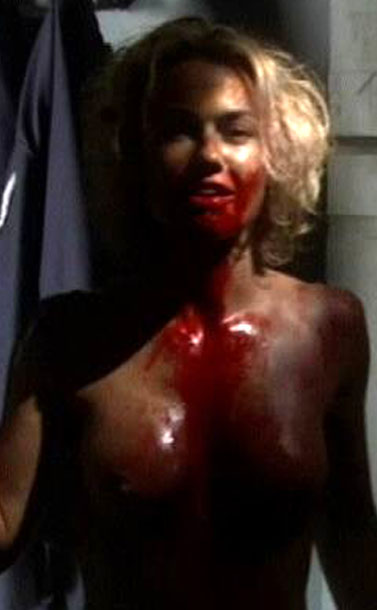Should you decide to accept it? (1/14/07)
____________
Starship Troopers 2: Hero of the Federation. [Phil Tippett, 2004. Written by Ed Neumeier.]
The heroic endeavors of gorgeously obnoxious Hitler Youth Caspar Van Dien, Denise Richards, and Doogie Howser having not, apparently, sufficed to conclude the interstellar war between Bugs and Men, as this second installment commences we discover yet another coeducational company of infantry stranded on yet another desolate and unforgiving desert planet surrounded by yet another ravenous horde of giant cockroaches; with, manifestly, no hope of evading annihilation — at least until somebody fortuitously recalls the proximity of an abandoned fortification to which the beleaguered party can [why not say it] bug out. Here after an undignified but not wholly unsuccessful retreat they discover amid the ruins erstwhile hero become Severe Attitude Problem Richard Burgi languishing in the brig — left behind, it seems, as an appetizer for the bugs, after an unusually acute attack of insubordination caused him to terminate his commanding officer with extreme [albeit, we gather from the albatrossian string of dogtags Burgi wears around his neck to remind himself of his duty to the dead, wholly justified] prejudice. — The war, it seems, has run a fastforward from Normandy to Vietnam; the freshfaced recruits to the Terrestrial Wehrmacht whose exploits we followed in the first installment have metamorphosed into bonetired dogfaced veterans; and fragging superiors who sacrifice the lives of their troops to advance their empty dreams of martial glory has become a moral imperative.
His spotty resume notwithstanding, Nurgi exudes a certain unshaven [though doubtless odiferous] masculine charm, which makes him, unquestionably, the Nick Fury of the piece [though it’s actually the hardbitten chick sergeant who chomps on cigars]; and the first firefight predictably provides an excuse to haul him out of his cell and put him in charge of the defense of the Alamo — which doesn’t look entirely hopeless, until a party of stragglers stumble in out of the perpetual dusk [“It’s been six months since I’ve seen the sun,” someone has already remarked] with strangely disturbing smiles on their faces, tell a curiously unconvincing story to explain their miraculous escape from the alldevouring insect legions, and set to work at once seducing the garrison — the better, it transpires, to infest them with bugs! the latest strategem of the cunning insect enemy, who have, it seems, studied those unending
Alien reruns on the galactic cable channels and come up with the idea of laying eggs in their mammalian victims which hatch into an arachnid form that takes control of its host after eating its brain [I guess they’ve seen
Dark City too] — a plan that will allow them to infiltrate human space and devour their enemy [messily, as the first few experiments demonstrate] from within; and prove once and for all that love, faith, hope, individuality, and internalized skeletal structure are evolutionary dead ends, and that the future belongs to the faceless Horde.
Not coincidentally this is also a plan that allows the story, which — lacking the money for real spacewar, and lacking the talent, apparently, to cut together the shots of the grunts firing their weapons aimlessly into the air with the CGI of the [curiously lethargic] bugs waving their forelegs around in any way that might create the impression that there was actually a fight going on — was going nowhere as an action movie, to reinvent itself as a claustrophobic greenlit tale of horror in which Dudes Besieged by Monsters die one by one in ways that are spectacularly disgusting [not to give too much away, still, I’m not sure I’ve ever seen a severed head tossed into a microwave before; and designated Femme Fatale Kelly Carlson provides a startling new interpretation of the concept of sucking face], in a dimly atmospheric steelwalled setting that recalls a doomed submarine.
Convention then demands, alas, that the heroics of Burgi must be unavailing, and only the designated Ripley, apprentice psychic Colleen Porch [pregnant, of course:
Alien movies are about motherhood] can survive.
So: everyone dies [and no one pleasantly]; Burgi, in life a candidate for the gallows, is posthumously made over as a recruiting poster by the Federation’s propaganda merchants; and the moral no one need speak aloud is not simply that war is everlasting hell and that those who direct its conduct are evil narcissistic fiends, but that the monsters within that gnaw their way out to devour our brains and take control of our actions are the lust for martial glory and the secret longing to abandon the burden of individuality and submit to the manipulation of authoritarian puppetmasters — to become as the bugs.
The authors [who until they pulled their genre shift were looking like hapless bozos] thus neatly disinherit themselves of the weaknesses of the first installment, which somehow managed to incorporate all the bad parts of the Heinlein original [not his weakest but certainly his most dangerous novel, an unapologetic paean to fascist militarism — and for just that reason, weird but true, frequently parodied: cf. e.g., Harry Harrison’s
Bill, The Galactic Hero] while unaccountably leaving out all the good parts, viz. the quasirobotic suits of armor the troopers were supposed to fly around in, and trying to patch the holes in the story with mindless reliance on CGI — and simultaneously provide themselves with ample grossout opportunity, for which they show much more talent and enthusiasm. — The result is just as silly as the first one was, but the characters here are far more engaging and the sentiment infinitely less offensive; making this, strange though it must seem, a more entertaining and probably a better movie.
____________True stories (11/7/06)

